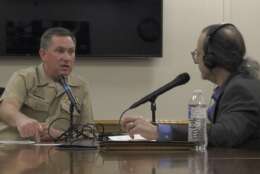Management
-
The VA's new Electronic Health Record is now running at a third location, although lawmakers remain concerned about future rollouts.
May 03, 2022 -
Guns of all sizes, some day steel cutting lasers and hypersonic launchers - none of it gets mounted on a Navy ship until it's been tested and vetted by the Naval Surface Warfare Center Dahlgren Division.
May 02, 2022 -
Members of Congress know the budget process, their primary mission in life, is a mess. But some efforts are brewing that at least some members hope will get the 2023 budget process under control.
May 02, 2022 -
Almost everything is connected to the internet which will expand the number of attack surfaces.
May 02, 2022 -
Federal CIO Clare Martorana has been briefing lawmakers about awards and the impact of the Technology Modernization Fund to ensure transparency and accountability.
May 02, 2022 -
While acceptable attire will obviously vary on the agency and the position, there’s some anecdotal evidence that some feds are getting flexibility with their workplace dress codes.
May 02, 2022 -
Eagle Hill Consulting research found the pandemic and the way it scrambled how people work has sparked what they call a great re-evaluation.
April 29, 2022 -
The Office of Management and Budget is naming Karin Orvis as its chief statistician, a position that hasn't had a permanent leader in more than two years.
April 29, 2022 -
The Postal Service is facing three separate lawsuits over its plans to purchase mostly gas-powered vehicles as part of its next-generation fleet.
April 28, 2022 -
Everyone feels overwhelmed or disconnected from time to time. Burnout happens when these feelings don't abate.
April 28, 2022 -
The agency decided to realign itself last October.
April 28, 2022 -
Perhaps on purpose, but the administration has offered only vague guidance on when or if or which federal employees must return to their offices.
April 28, 2022 -
Measuring risks and setting benchmarks for emerging fintech is top of mind for agencies such as the National Institute of Standards and Technology and the Commerce Department.
April 28, 2022 -
Karen Dahut, president of Booz Allen’s Defense Sector joins Aileen Black on this week's Leaders and Legends to share her thoughts on leadership and how strong leaders can inspire the teams they lead.
April 28, 2022 -
The Postal Service is seeking to hire 2,800 front-line supervisors over the coming months, in an effort to improve staffing across its network.
April 27, 2022














